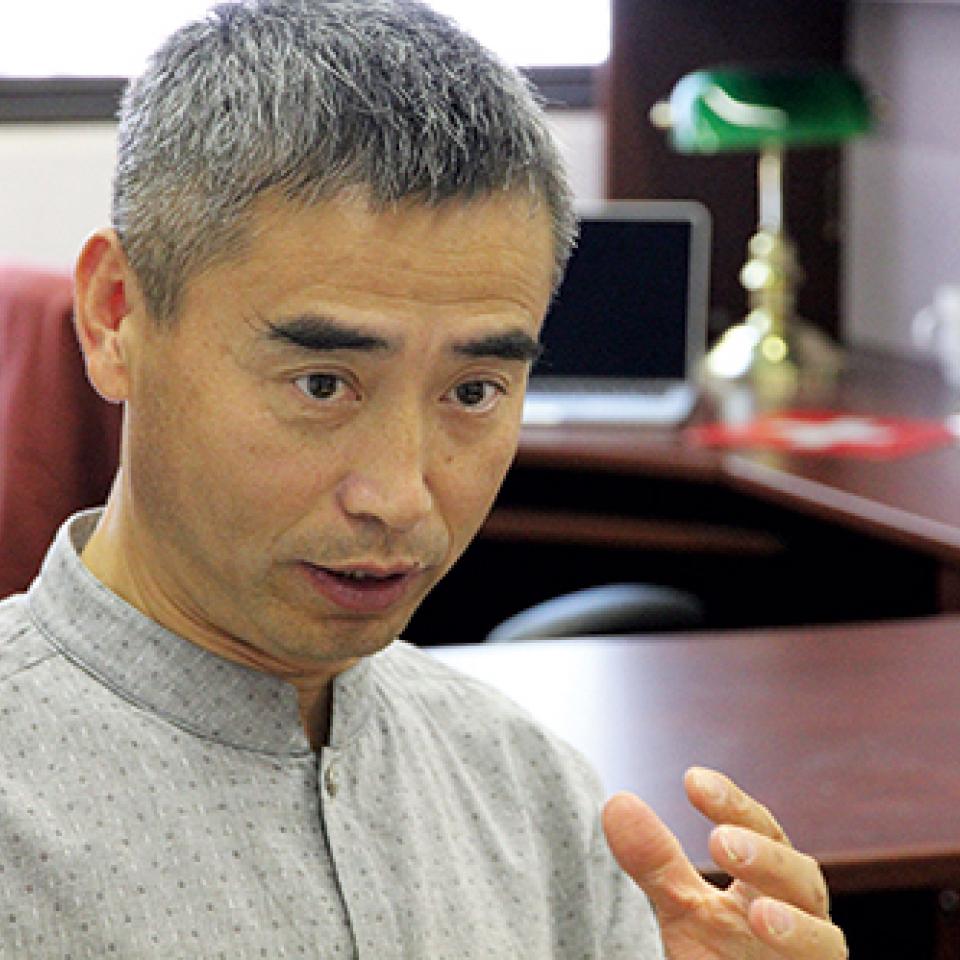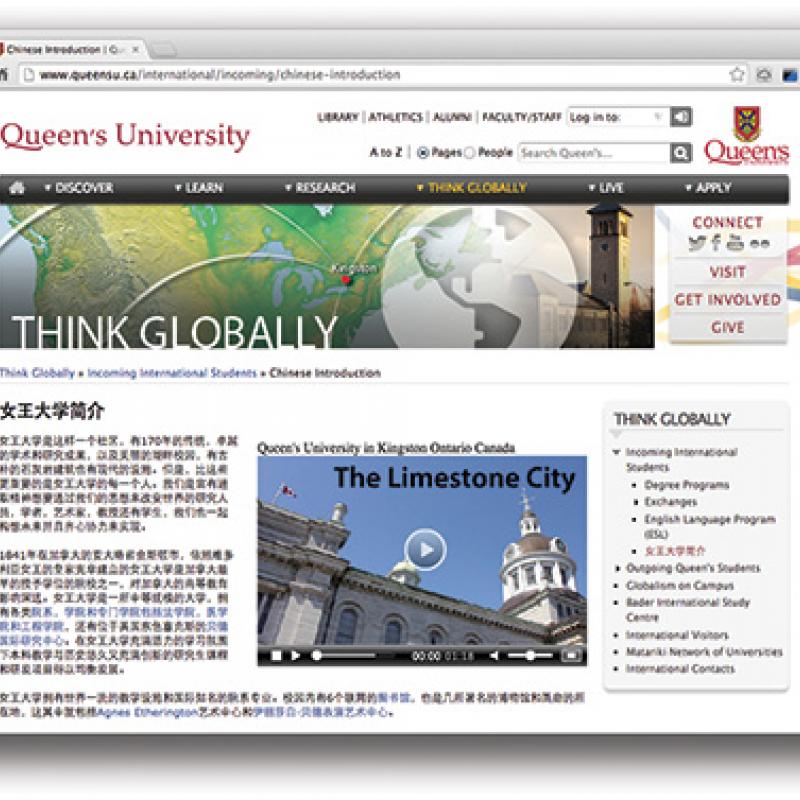Q: You have been Queen’s China Liaison Officer since 2007. What does that role entail?
A: My job is to act as a bridge between Queen’s and China, helping our faculties build academic partnerships and research collaborations, as well as supporting recruitment initiatives and alumni relations. China is one of Queen’s priority regions internationally and so I’m also working closely with Kathy O’Brien, Associate Vice-Principal, International, to develop a China strategy that will support the comprehensive international plan that is currently in development.
Q: Queen’s has been very active in China recently, in terms of recruitment, academic programs and research. Are there any projects you would like to highlight?
A: The School of Business has a new Master of Finance program with Renmin University, and Queen’s recently signed a training agreement with the Chinese Ministry of Land and Resources. We are also working to finalize a joint two-plus-two degree program, in environmental sciences and biology, with Tongji University in Shanghai. Students would do two years of their degree at Tongji and two years at Queen’s. It will be our first international two-plus-two program. The Faculty of Engineering and Applied Science is also exploring new joint programs and other initiatives with Chinese institutions.
Q: You mentioned one of your jobs is to promote research collaborations in China. Is there interest at Queen’s in research on China?
A: I’ve been seeing more and more Queen’s faculty members interested in working in China. It provides a wonderful laboratory for any field of research, simply because of its population size and its stage of development and growth. There are many issues and questions for researchers to study and there is much interest in China in collaboration with Canadian researchers. We have been working to help build platforms for research collaboration, such as the Sino-Canada Network for the Environment and Sustainable Development in partnership with Tongji and involving other Chinese institutions, including Fudan University, also in Shanghai.
Q: Queen’s also offers many exchange opportunities in China. Do you see those experiences as valuable for students?
A: Even a short time abroad has an eye-opening and inspirational value for students. A good example is Queen’s Semester in Shanghai program, coordinated by the Department of Languages, Literatures and Cultures, in partnership with Fudan. Queen’s students study at Fudan and, new this year, the program becomes a true exchange with 12 Chinese students coming to study at Queen’s.
Q: China is currently the largest source of international undergraduate students for Queen’s. Do you see Canada and Queen’s continuing to be an attractive destination for students?
A: Canada remains a favoured destination for parents and students and the trend of sending students overseas is not slowing, it’s growing as the number of families that can afford it also grows. I think Queen’s offers something special to Chinese students – an exceptional undergraduate education where our faculty members are very accessible to students. I think the relationships Queen’s has built with top institutions in China will continue to grow and have a positive effect on our reputation and our ability to attract top students.
This article originally ran in the Queen’s Gazette.
A sample of Queen’s partnerships with universities in China
Tongji two-plus-two
The first class of the joint two-plus-two degree program, in environmental science and biology, with Tongji University in Shanghai is due to enrol in September 2015. Brian Cumming, Director, School of Environmental Studies, led the development of the program. “This program will benefit students at both universities by providing a diversity of perspectives, hopefully leading to an enhanced understanding of global environmental issues,” he says.
Master of Finance program, Renmin University
The one-year M.Fin. program started this fall. Canadian and Chinese students study in Beijing with professors from both Queen’s and Renmin University’s Hanqing Advanced Institute of Economics and Finance. Finance professionals from both countries take part as guest lecturers.
Semester in Shanghai, Fudan University
Originally a program of Queen’s Department of Global Development Studies, and offered since 2005, the exchange program is now open to third and fourth-year students in Arts and Science. Dr. James Miller (Languages, Literatures and Cultures) leads the program, which pairs each Queen’s student with a Fudan student for a core course. In addition, the students are offered a number of elective courses, in language, history, religion and culture.
The Queen’s School of Policy Studies (QPS) also offers a program in Shanghai for MPA students. Started in 2006, the Fudan Interchange program gives graduate students the opportunity to study at the China Centre for Economic Studies at Fudan University. During the six-week program, students study the Chinese economy and current policy issues and participate in field trips.
Sino-Canada Network for the Environment and Sustainable Development
Established in 2013 by Queen’s and Tongji University, the network laid the groundwork for a number of collaborations, including joint research on low-impact urban development and aquatic ecosystem remediation, and monitoring environmental change using
remote sensing and GIS (geographic information system) technology.
Queen’s research in China
There are many Queen’s faculty members teaching and conducting research with partners in China. Here are just three of them….
- Dr. Mark Rosenberg (Geography) holds the Canada Research Chair in Development Studies at Queen’s. Collaborating with colleagues from Canada, the Chinese Academy of Sciences Institute of Geographic Science, Natural Resources Research at Beijing University, and the Chinese Centre for Disease Control, he studies the effects of social deprivation in the elderly population. Read more about his work in China.
- Dr. Susan Cole (Pathology and Molecular Medicine, Cancer Biology and Genetics) holds the Canada Research Chair in Cancer Biology and Bracken Chair in Genetics and Molecular Medicine at Queen’s. In 2013, she was made an honorary professor at Jinan University in Guangzhou (Canton) where she is participating in China’s Leading Talent Program of Guangdong Province. (Also involved in this program is Yu Qiang, PhD’98 [Pharmacology], now a senior group leader at the Genome Institute of Singapore). Dr. Cole collaborates with colleagues around the world in her work on proteins that can make tumour cells drug resistant by acting as drug efflux pumps.
- Dr. Emily Hill (History) pursues research interests in modern Chinese history and politics. She supervises MA and PhD students investigating topics related to the rise of Chinese Communism and the evolution of contemporary China’s political and social systems. She has developed close ties with historians and other scholars at Fudan University. In recent years, she has also been affiliated with the Department of History at Zhejiang University in Hangzhou. In research visits to Zhejiang, Dr. Hill has focused on two topics: the scholarly rehabilitation of Chiang Kai-shek, former national leader, and the emergence of a “back to the land” movement in China today.
女王大学简介
[Introduction to Queen’s University]
In October, Queen’s launched a Chinese web page with information about the university for prospective undergraduate students and their parents. The page serves as a pilot project with a long-term goal of developing pages in other languages.
Translation: 女王大学 = Female Emperor Big School

